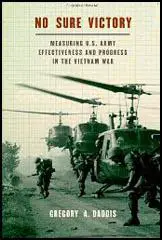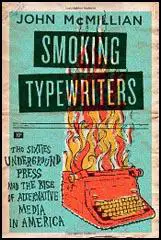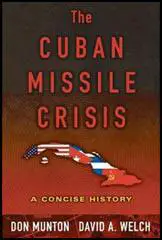Spartacus Review
Volume 55: 26th October, 2011
The Cold War

Title: No Sure Victory
Author: Gregory A. Daddis
Editor:
Publisher: Oxford University Press
Price: £11.95
Bookshop: Amazon
Spartacus Website: The Vietnam War
Category:
It is commonly thought that the U.S. Army in Vietnam, thrust into a war in which territory occupied was meaningless, depended on body counts as its sole measure of military progress. In No Sure Victory, Army officer and historian Gregory A. Daddis uncovers the truth behind this gross simplification of the historical record. Daddis shows that, confronted by an unfamiliar enemy and an even more unfamiliar form of warfare, the U.S. Army adopted a massive, and eventually unmanageable, system of measurements and formulas to track the progress of military operations that ranged from pacification efforts to search-and-destroy missions. Concentrating more on data collection and less on data analysis, these indiscriminate attempts to gauge success may actually have hindered the army's ability to evaluate the true outcome of the fight at hand--a roadblock that Daddis believes significantly contributed to the multitude of failures that American forces in Vietnam faced. Filled with incisive analysis and rich historical detail, No Sure Victory is a valuable case study in unconventional warfare, a cautionary tale that offers important perspectives on how to measure performance in current and future armed conflict.

Title: Smoking Typewriters
Author: John McMillian
Editor:
Publisher: Oxford University Press
Price: £17.99
Bookshop: Amazon
Spartacus Website: Journalism
Category:
How did the New Left uprising of the 1960s happen? What caused millions of young people--many of them affluent and college educated--to suddenly decide that American society needed to be completely overhauled? In Smoking Typewriters, historian John McMillian shows that one answer to these questions can be found in the emergence of a dynamic underground press in the 1960s. Following the lead of papers like the Los Angeles Free Press, the East Village Other, and the Berkeley Barb, young people across the country launched hundreds of mimeographed pamphlets and flyers, small press magazines, and underground newspapers. New and cheap printing technologies had democratized the publishing process, and by the decade's end the combined circulation of underground papers stretched into the millions. Though not technically illegal, these papers were often genuinely subversive, and many who produced and sold them--on street-corners, at poetry readings, gallery openings, and coffeehouses--became targets of harassment from local and federal authorities. With writers who actively participated in the events they described, underground newspapers captured the zeitgeist of the '60s, speaking directly to their readers, and reflecting and magnifying the spirit of cultural and political protest. McMillian gives special attention to the ways underground newspapers fostered a sense of community and played a vital role in shaping the New Left's "movement culture." By putting the underground press at the forefront, McMillian underscores the degree to which the political energy of the 1960s emerged from the grassroots, rather than the national office of Students for a Democratic Society (SDS), which historians of the era typically highlight. Deeply researched and eloquently written, Smoking Typewriters captures all the youthful idealism and vibrant tumult of the 1960s as it delivers a brilliant reappraisal of the origins and development of the New Left rebellion.

Title: The Cuban Missile Crisis
Author: Don Munton & David A. Welch
Editor:
Publisher: Oxford University Press
Price: £12.99
Bookshop: Amazon
Spartacus Website: Cuban Missile Crisis
Category:
This book fills the gap between the longer, more detailed texts on the Cuban Missile Crisis, and the popular histories, most notably Robert F. Kennedy's Thirteen Days (and the 2000 TV movie of the same title). Munton and Welch have written a short, readable text that stresses the big picture, answers the important questions and corrects the historical inaccuracies of Thirteen Days. The authors make use of newly available sources from US and Russian archives to present Soviet and Cuban perspectives in the crisis, which have in the past been unavailable or downplayed.

Title: The Spiritual Industrial Complex
Author: Jonathan P. Herzog
Editor:
Publisher: Oxford University Press
Price: £22.50
Bookshop: Amazon
Spartacus Website: The Cold War
Category:
In his farewell address, Dwight D. Eisenhower warned the nation of the perils of the military-industrial complex, but Eisenhower had spent his presidency contributing to another, lesser known, Cold War collaboration: the spiritual-industrial complex. This fascinating volume argues that American leaders in the early Cold War considered the conflict to be profoundly religious, that they saw Communism not as godless but as a religion fighting faith with faith. As a result, they deliberately used religious beliefs and institutions as part of the plan to defeat the Soviet enemy. Jonathan Herzog offers an illuminating account of the spiritual-industrial complex, chronicling the rhetoric, programs, and policies that became its hallmarks. Herzog shows how these efforts played out in areas of American life both predictable and unexpected--from pulpits and presidential appeals to national faith drives, military training barracks, public school classrooms, and Hollywood epics. Finally, he reveals that if the spiritual-industrial complex faded in the 1960s, its echoes could still be heard in Ronald Reagan's 1980s.
